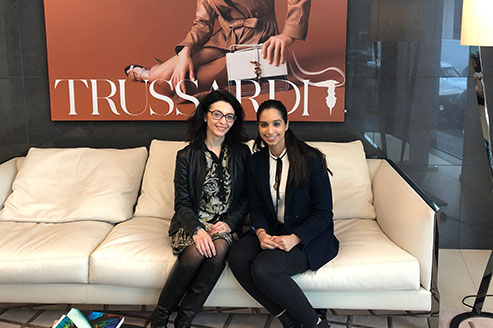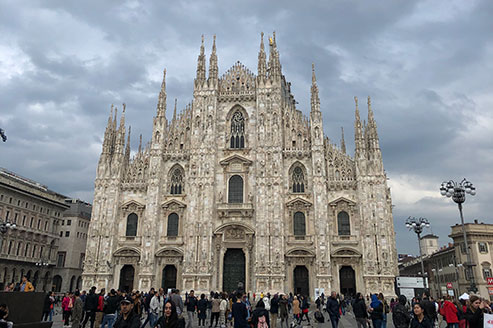Made in Italy
Running the legal department for one of the most recognisable luxury fashion brands in the world is not all glitz and glam. Harveen learns about how the industry’s leading in-house lawyers overcome challenges arising from advertising, copyright and counterfeit.
Riding my bike around the famed Duomo di Milano and perusing the designer boutiques found within the opulent Galleria Vittorio Emanuele II, it is easy to surmise that the people of Milan understand fashion. Since the 16th century, the city has maintained its reputation as the fashion capital of the world. Today it is home to leading fashion houses such as Giorgio Armani, Giuseppe Zanotti, Roberto Cavalli, Versace, Dolce & Gabbana, Trussardi, Prada and Gucci – just to name a few.
Running these global fashion empires takes a team of skilled, yet savvy business professionals. Crucial to operations are in-house lawyers, who tirelessly work behind the scenes, involved in every aspect of the brand from design to production to distribution. Catching up with Sara Citterio, corporate affairs, legal and compliance manager at Trussardi and Lucia Capotondi, group general counsel of Giuseppe Zanotti we peek inside the charismatic world of high fashion.
LA BELLA FIGURA
Giuseppe Zanotti is an Italian luxury footwear and fashion designer whose shoes have been worn by celebrities such as Lady Gaga, Jennifer Lopez and Madonna. The brand is currently sold in more than 75 countries worldwide through a network of boutiques, franchisees and luxury retailers. Leading legal operations is Lucia Capotondi, who describes a typical day at work as busy, balancing multiple meetings across various jurisdictions.
‘We have retail shops all over the world, in US, in China, Honk Kong, in Macau, Dubai and all over Europe,’ says Capotondi. ‘My daily work, is organised according to time zones. I generally start with calling China and our Asian company, then late morning I speak to our European company and Dubai and then late afternoon I have to speak with Japan.’ Despite her responsibilities being varied, there are common challenges across regions.
‘The topics are really different and wide, from distribution agreements, franchise agreements, lease agreements, retail agreements,’ says Capotondi. But the most problematic legal challenges originate from the digital world. She explains, ‘this is because advertising now is not done on traditional paper with magazines, it is made on social media.’ The rules governing online advertising are still in their infancy and with a lot at stake for luxury fashion houses, it is imperative that general counsel remain at the forefront of developing regulations, says Capotondi.
FASHION FORWARD
Social media and the internet have transformed the way companies across the world advertise. Luxury fashion retailers have embraced online advertising in the last two or three years. In the past, advertising was predominantly done through magazines and newspapers. A predetermined number of pages would be allocated per campaign, according to Capotondi.
‘This sort of advertising was very simple, it was on paper and it was managed directly by the magazine.’
As the popularity of magazines started to wane, advertising campaigns become digital. From a legal perspective, advertising on social media can cause major challenges for fashion brands. Capotondi explains, that it is important for brands to comply with advertising regulations, and that means drafting contracts specific to each online post.
‘Social media is quite risky and sensitive because you need to do the best advertising, but in compliance with all the regulatory requirements. This is one of the most important challenges.’ says Capotondi.
Currently, drawing up legal contracts with social media influencers is a significant challenge for in-house counsel: ‘Advertising is managed by influencers that sometimes are young, and do not have any legal knowledge or marketing knowledge,’ says Capotondi, ‘but they have one million followers.’
A common legal issue in-house lawyers encounter is ensuring posts are tagged by influencers or celebrities as being paid advertisements, explains Capotondi.
‘If you pay an influencer or if you pay a celebrity to wear your shoes…they need to insert a specific tag, ‘supplied’ or ‘branded by whatever’ otherwise you are subject to a fine, because this is not compliant with advertising regulations.’
For example when Lady Gaga wore Giuseppe Zanotti shoes to the 2019 Oscars, it was important that she tagged the company. This action was essential, not only because it exposed the brand to her 35.4 million followers, but because of the advertising regulations. In the past, luxury fashion labels could give shoes to celebrities as presents, but now everything has to be transparent, says Capotondi. Going digital means that agreements need to be drafted specifically to ensure influencers and celebrities behave and promote brands in a way that is compliant with those advertising laws.
For luxury fashion retailers, digital campaigns are vital to promoting new collections. ‘For example, Gucci is the most social brand – they invest a lot of money on digital advertising – it is giving rise to a new era. Unfortunately, the traditional magazine is not sufficient anymore.’
‘You have to be very proactive to ensure that your product is getting pull. You need to have a digital campaign.’
The target market has changed as a new generation of digitally savvy customers emerge. Exemplifying this change is China, which is both a young and digitally acute market.
ADVERTISING FAUX PAS
In November of 2018, famed Italian fashion brand Dolce & Gabbana uploaded a digital campaign on Chinese social media platform Weibo. Within 24 hours, the video – which depicted a Chinese model eating Italian food with chopsticks, went viral. Initially intended to advertise an upcoming fashion show, the company’s digital campaign was deemed racist by many commentators. What ensued was a media frenzy, a public boycott of the brand and the cancellation of the fashion show.
In situations such as these, in-house legal teams play a pivotal role in preventing and managing marketing mistakes.
‘It is very common for luxury brands to use social media to advertise’ says Capotondi, arguably the Dolce & Gabbana situation in china would not have happened in traditional magazine advertising. ‘As soon as Dolce Gabbana uploaded this video, a lot of followers, a lot of people, started to immediately comment on the video.’
When things go wrong it is important to have the ability or remove a video or image says Capotondi. The power of social media cannot be underestimated and in-house lawyers play an important role navigating legal regulations.
Dolce & Gabbana survived the advertising blunder, although the brand did suffer financial losses. What makes it difficult is that since social media advertising is relatively new, the legal framework surrounding digital campaigns is still evolving. Capotondi describes the situation: ‘there are no rules, you have to learn by doing.’
CURBING COPYRIGHT
Protecting the intellectual property of advertising campaigns is an important responsibility for in-house counsel. This is especially pertinent when enlisting the services of influencers, says Capotondi.
‘Sometimes, these influencers are young and don’t even know they need to have an agreement. You need to ensure the content of the post, the images of the influencer, together with your product…[are owned by] you and not to them, because otherwise you pay for content that is not yours, cannot be used anymore.’
Therefore legal plays an important role in drafting contracts that ensure brands own the copyright of paid content posted by influencers, explains Capotondi.
On the other hand, protecting the copyright of designs is also a foremost challenge for in-house counsel.
‘I need to confirm design, colour and drawing can be used and is something that is quite crucial in luxury brands.’
Capotondi says the design process of shoes is similar to the ‘Sound of Music’: there are only so many note combinations that can be created and in-house counsel play an active role checking that each design has not been used by another designer in the past.
‘I work together with the designer to assess that the design is original, is ours, and we do not have any reason that other brands can say that we made some copy.’
The work of in-house designers at Trussardi are also evaluated in order to avoid copyright issues. Trussardi is a quintessential Italian brand that has established itself as a leading high fashion retailer over the 100 years it has been in operation. Sara Citterio head of legal oversees a plethora of legal operations, including curbing copyright concerns.
‘For example like bags and maybe more often shoes or accessories, I am sometimes requested to research on public search networks, to see if someone before has deposited or filed a request for protection of intellectual property on a particular model,’ says Citterio.
Maintaining its prestigious reputation and ensuring designs are original is paramount for luxury brand design houses.
PRIORITISING PRIVACY
Privacy protection has been a contentious topic across the EU and globally. In-house counsel have been forced to re-evaluate privacy policies as new regulations continue to impact the world of high fashion.
‘An issue that is impacting all kinds of industries, not just our industry is the change in privacy legislation in the EU – and this is of course having a toll on us as well,’ explains Citterio.
‘We are taking care of all the legal issues regarding all the countries where we are present. Off course it’s mainly Italy and Europe but we have also subsidiaries in other countries for example Russia and Asia – mainly in Hong Kong and Shanghai.’
Drafting polices that cater to the legal differences in multiple jurisdictions is a big challenge, says Citterio.
‘The main issue right now is that we have one sort of homogenous legislation in Europe, but this also has to be combined with the Russian legislation and Chinese legislation. So at the moment we are actually tackling the differences and trying to build up a policy that …is good for everyone in our group.’
Putting together a comprehensive privacy policy that covers multiple jurisdictions requires general counsel to be both pre-emptive and tactical.
COUNTERACTING COUNTERFEIT
Although this is not a new legal challenge, technology has made the sale of counterfeit products easier and more accessible. Group general counsel of Giuseppe Zanotti highlights the importance of fashion retailers to put in place preventative measures.
‘So now we accept a new process, for new activity, to detect third parties selling counterfeit products online.’
The process scans third party platforms such as Facebook, Instagram, Alibaba and Amazon and identifies the sale of fraudulent products, says Capotondi. She explains, once the sale of counterfeit products have been detected, it is also important to set up processes around how to deal with such activity. Overall Captondi explains that it is important to enforce your rights and work towards removing the products from the platforms. In order to achieve this, Zanotti has built up relationships with managers from leading sales platforms such as Alibaba, Facebook and Instagram. The goal, says Capotondi, is to provide sufficient evidence that the products are fake and infringing upon the rights of the brand.
The sale of counterfeit products is an issue that plagues almost all luxury fashion brands. Looking on the brighter side Citterio, legal head of Trussardi, acknowledges the counterfeit paradox:
‘If you have a product that begins being counterfeited, it means that somehow you are getting famous. It’s sort of recognition of your brand. To some extent it is also regarded as a form of being successful in this industry.’
There is a fundamental industry belief, explains Citterio, ‘if no one is really trying to replicate your products then you are just left wondering if you are successful or not. But once you start seeing it being replicated and sold online that is a sign that you’re getting there.’
Nevertheless the sale of counterfeit products have the potential to diminish a brand. Taking a more focused legal approach to the issue, Trussardi primarily focuses on targeting counterfeit products that may be harmful to buyers.
‘We have seen a dramatic increase in cases involving counterfeit fragrances in the last couple of years,’ says Citterio.
‘We consider this to be a very sensitive issue because it’s something that you put in your body. And if it’s not the correct product it could cause you problems in terms of health.’
SHOP TILL YOU DROP
Online sales contribute a huge percentage of business turnover for luxury fashion labels, Capotondi says.
‘The biggest part of the turnover now of luxury brands is made with e-commerce, we sell online.’
Naturally then, in-house counsel play an important role in managing the legal viability of online sales whilst also protecting the brand.
‘What I have to say is that the lawyer, not only in the luxury fashion industry but all over the world, needs to be a little bit curious and also open to technology. I think this is something that is important, and a challenge for in-house counsel.’
In-house lawyers working in the luxury fashion industry are involved in the whole company, from the design phase, to distribution agreements, right down to marketing and online sales. For Capotondi and her team at Giuseppe Zanotti and Sara Citterio and her team at Trussardi there is always something to do.
Despite the challenges brought by social media, the fashion industry in Italy continues to thrive. The in-house counsel at Italian fashion houses are leading the way through new marketing regulations.
Capotondi concludes, ‘sometimes there is a learn by doing approach. That’s why this is a completely new world, a completely new challenge for marketing and for legal.’



